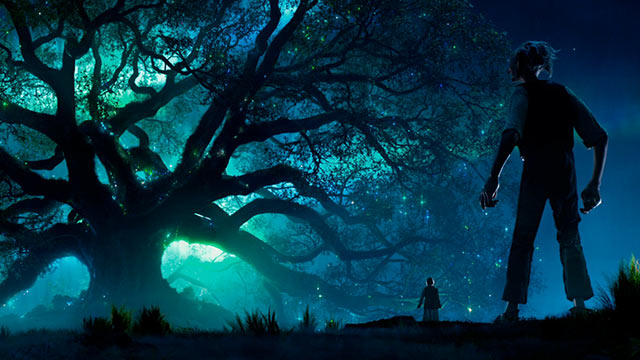A Big Friend, by Bobo Chang
29 Jun
In an age and culture where “bigger” is almost always better, the titular giant in Steven Spielberg’s The BFG illustrates that big is nice, but does come with some trouble. Visually gorgeous with a handful of grin-inducing moments, but dragged down by a sleepy tone, this could be said of the film itself.
The action starts rather briskly in 1980’s London as Sophie, a young orphan, discovers a giant on the streets outside. Before we know it, he plucks her out of the orphanage and whisks her off to Giant Country. Here, things slow down considerably as Sophie gets acquainted with Giant life, where the BFG – Big Friendly Giant – must submit to the brutish, more gigantic and yet more childlike, child-chomping Giants. The BFG also catches dreams for a living, and instead of eating children, eats loads of “snozzcumber”, a Giant-ese term among many amusing, ear-tingling terms for a cucumber-like vegetable… with guts. Soon, the bigger, unfriendlier Giants sniff out a “human bean” near the BFG and essentially the rest of the film is the story of the blossoming friendship between BFG and Sophie as he protects her from the hungry bad guys, in pursuit of her “phizzwizard”, or her happy dream.
The striking visuals are abundant in a 3D-friendly, beautifully shot landscape. In Spielberg’s hands, it’s hard to discern if it is green-screen or if such a magical place actually exists. In addition, the bedtime-story nature of the source material, while adapted fittingly for the screen by the late Melissa Mathison, soaks the majority of the film in narrative melatonin. The drawn-out sequences, particularly the action sequences, are indeed entertaining and cleverly unfold, but could have gotten to the point in a swifter manner, if not simply for logic’s sake.
However, Spielberg and the effects team not only nail the seamless CG of Giant country and their interactions with non-CG people, but they capture real warmth and humanity, particularly in Mark Rylance’s fantastic performance as the BFG. Rylance expertly wears the contrast of a small, humble man in a big body. Sophie, played by Ruby Barnhill, is a gem (pun intended) in the typical Spielbergian wide-eyed, too-smart-for-their-own-good adolescent. Barnhill plays her courage with charm and poise, while still naturally displaying her heart’s loneliness. Complementing Rylance’s “small” man, she’s certainly a “big” girl. Very much a kids’ movie, the rest of the cast play their over-the-top silliness moments convincingly while grounding themselves in the humanity that makes this film and the subject matter so timeless.
Possibly the most delightful part of the film and source is the BFG’s frustration: that “words” have been “such a twitch-tickling problem” his whole life. Ironically, it’s his words – the dialogue, and Rylance’s delivery of them – that help create this dream world.
In contrast, the John Williams score, in full Disney mode, is a bit tiresome at times. Every moment seems to be accented with those familiar strings without providing a memorable theme like many a Williams and Spielberg work before. Not that it’s bad by any means, it’s just a lot of decent.
From the tender exchanges between BFG and Sophie to a memorable sequence involving British royalty that reeks of classic Spielberg humor, The BFG is is as big and friendly as the title suggests. There are a few frightening moments, which might put off some children, but is a welcome balance, harkening back to the Disney tales of old, where the light is better seen when piercing through the darkness.
This light, with talks of forgiveness, the purity of a child’s desire/dreams, the fulfillment of loneliness via “agape” love, and even loose representations of a Christ or God figure – that is, having a big, benevolent friend; a dream-maker from beyond who fights off threats, takes one from their orphan status and gives them their paradise and a royal status – that reflects the Truth that this age and culture need more of. While its depiction on this earth is imperfect, much like the film, the Big Friendliness is enough to leave us satisfied, yet wanting more. Like waking up from a “phizzwizard”.




No comments yet